I hope you're fitting to the peaks, since you're looking for worst-case complexity.
Anyway...
If a and b are N bits long, then in the worst case (Fibonacci pairs), the extended Euclidean algorithm will take O(N) iterations.
Let f(N) be the cost of a single iteration. Certainly f(N) will be at least linear, but still polynomial, and nearly half of the iterations in each case will involve arguments at least N/2 bits long, so the total complexity will be in O(N * f(N))
Now, what exactly f(N) is will depend in the particulars of how large-integer operations are implemented in your library. The division/remainder operation will dominate, although wikipedia says that if you use Newton–Raphson division then the complexity of that is the same as multiplication (although there will certainly be a constant multiplier!).
Multiplication costs O(N * log N * log log N) in the limit with the Schönhage–Strassen, and hopefully your library will use that eventually... so when the numbers get really big, the extended Euclidean algorithm should take O(N2 * log N * log log N) in the worst case.

